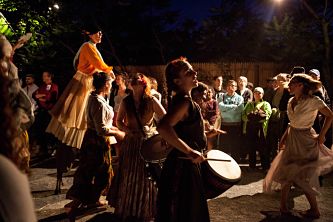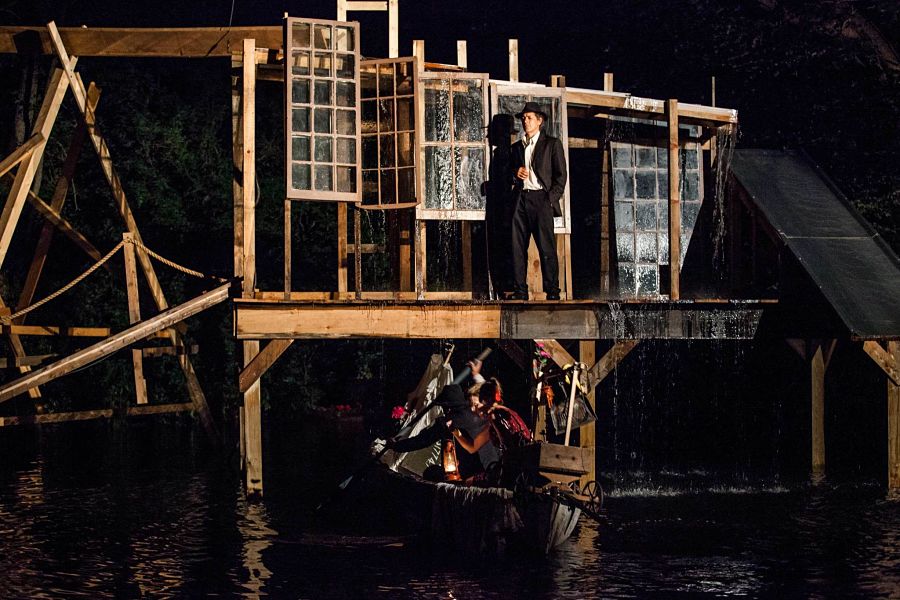Consult your programs! That’s not an admonition you’d usually take too seriously at one of the captivating open-air summer spectacles presented by Double Edge Theatre of Ashfield, Mass. After all, the tales this innovative farm-based troupe spins for its roving audiences on summer evenings are based on familiar myths and literary classics—you can figure that Penelope will be pining for her absent hero in The Odyssey, that Sancho Panza will be windmill-spotting in The Illustrious Return of Don Quixote, that there’ll be flying genies and flouncing veils in Shahrazad. But this past summer’s spectacle had a more mysterious title—Once a Blue Moon—and for the first time since the company’s Indoor/Outdoor Traveling Spectacle series was inaugurated in 2002, the info in the program became a key element of the experience.
Indeed, the show’s festive processions and jangling folk tunes provided Ashfield spectators with an instant clue that they were deep in Latin America—but without those program notes, they might not have understood just where this south-of-the-border ramble originated or the extent of its metaphorical implications. Blue Moon, it turns out, combines the company’s penchant for borrowing from the world of literature and ideas—the text judiciously quotes such notables as Márquez, Borges, Neruda, and Octavio Paz—with the personal story of one of its key members, Argentinian-born lead actor and co-artistic director Carlos Uriona.
Uriona’s story needs no mythic embellishment. A theatre organizer and activist during the years of his home country’s heavy-handed military dictatorship and founder of the acclaimed puppet troupe Diablomundo, he joined Double Edge in 1996 and has since played an array of leading roles, from the errant Quixote to Athos in The Three Musketeers. Uriona’s journey from Argentina to Ashfield isn’t exactly Blue Moon’s subject, but it provides a frame for the show’s elegant riffs, digressions, and imaginative effects.
And never have those elements—engineered under the rigorous direction of Double Edge founder Stacy Klein—been on more impressive display: Blue Moon is a cauldron of ideas and a feast for the senses.
Consult your programs. You’ll learn that the play’s initial locale is a Latin American village called Agua Santa—that means “holy water”—and the baggy-suited fellow with a suitcase spouting folksy philosophy (“You cannot step into the same river twice”) is a traveler, played by Uriona, who has come home to discover that his hometown’s citizens are being displaced by rampant economic development. The traveler and his compatriots—an immigrant peddler (co-artistic director Matthew Glassman), his arranged-marriage bride, the proprietress of a local brothel, and several others—lead the audience on a music-punctuated guided tour of Agua Santa and its environs, involving them in a wedding, a comically sensuous cabaret, a dreamily nightmarish flood, and, finally, a showdown on the lip of a translucent three-tiered dam (designed by Jeff Bird to bisect the farm’s tree-lined pond) with the cigar-chomping British industrialist (Adam Bright) who justifies his capitalist/colonialist intrusions with paeans to an idealized future. The effect is heady, provocative, exhilarating.

This summer’s initial engagement of Blue Moon ended in late August, but the production (like the company’s widely seen Chagall meditation The Grand Parade) will enter the Double Edge repertory for upcoming seasons and is likely, in this reporter’s estimation, to become one of its most treasured works. American Theatre spoke with Uriona and Klein, who are married, over breakfast on a balmy August Sunday in Ashfield, early in the show’s run.
JIM O’QUINN: Once a Blue Moon seems to be a memory piece, based in part on your experience. Tell me the story.
CARLOS URIONA: The story is that these outsiders arrived in a Latin American community and dammed the river, and all these people who lived there had to move. Similar things happened here in this part of Massachusetts, too! But the way people are treated in Latin America is different. We are still developing the plot of the show—we made changes even today.
How much of this is your literal experience, and how much is fanciful?
URIONA: It’s hard to tell. A lot of the stories, or the kernel of the stories, come from the writers you see credited in the program. But the way of telling, of talking, is mine—I go on tangents all the time. Something Borges always said is that the Spanish language is more available for poetry. That language leaves things open for you to understand, while English narrows it—English is so good for business and practicality. But in Spanish, even the verb “to be” is divided into “to be” and “to be with”—one tells you what I am, the other tells you how I am being. That to me is a philosophical matter already. It is always leaving things open for interpretation. Our idea was to capture this indeterminacy.
My grandmother, for instance, was a vivid character—she doesn’t appear here, but I talk about her and her powerful image. She once stopped a police raid from happening in my neighborhood. She went outside, stood very calm, and said to the police—she was about 77!—“Without a warrant you do not step into my house!” Her house was packed with all these subversive books that we read, and she stood alone in front of a group of soldiers and kept them away. She said, “Just shoot me. I am a good Catholic, I go to church every day, I don’t know why you suspect me.”
This is such personal material. How much of a departure is it for you to switch to personal rather than classical sources?
STACY KLEIN: We wanted to do something about Carlos, his culture, his ways of being. My work has dealt with the Jewish culture a lot, but after our interesting experience with Don Quixote, Latin American themes have just been waiting to be put into the mix. In this spectacle we’re able to include the audience in new ways—they can say things, not just join in the songs. The whole approach is more inclusive.
URIONA: Six years ago, we would not have dared to present something that was made like this. We had been looking for connections to the audience that the classics would bridge, based on shared knowledge, as when people go to the opera already knowing the story and the music. This, on the other hand, is totally Double Edge.

Those little animals that peer out of the greenery in the distance—that’s such a small detail, so far away. Was there an actor hiding there…a puppet?
KLEIN: Yes, there are actors stationed there with a mask. But this is magic realism, and you must believe that these are creatures following you around!
In the cabaret scene, were you evoking La Boca, the neighborhood of the rural poor in Buenos Aires? I know that’s where lower-class immigrants fresh from Europe would be likely to settle.
URIONA: Yes, La Boca is a synonym for “slum.” Buenos Aires is at the edge of the rain forest—just 20 kilometers north you enter it. The conquistadors chose such places to establish cities, because the forest environment was not that friendly. And in this slum, we visit a brothel—a very family-friendly brothel! The proprietor has created a sort of safe house there for outlaws and rebels, all sorts of people. The truth is that when I was very young, the age my sons are now, I used to go to brothels, not to have sex, but to listen to conversations and to drink.
KLEIN: Are you sure you want this recorded?
URIONA: Sure, I’m not running for any office, I’m not going to be a priest—what do I have to hide? There were always brothels in the port areas, where one could meet criminals, artists, all different sorts of people. People who want to be different need places where they can be safe—where they can be honest without being vulgar. We deal with so much violence today on TV and in the world—this show brings up issues that people can begin thinking about in a more human way. Lots of kids who feel like outsiders need to know they can be different, and that’s okay.
Who does Adam Bright’s British character represent?
KLEIN: He’s not a particular character—he’s English only because of Adam [who is originally from Kent, England]. The character is actually based on the corrupt bureaucrats whose mishandling of Hurricane Katrina and Sandy allowed people who lived in the South and Northeast to become victims of climate change. It’s not about colonialism so much as what we’re doing to the environment. Adam’s character represents the arrogance of capitalism—he doesn’t recognize the implications of his actions. You know, reports indicate that the number of those fleeing from development projects is almost equal to the number fleeing from disasters.
Might you ever do this show all in Spanish?
KLEIN: Absolutely. I think the poetry will in fact be enhanced. We’re excited to keep working in this vein. We’ll do it again next summer, and we’re also starting spectacle tours next year. This and The Odyssey will go well together. Both shows partake of many African and Latin traditions—church celebrations, Carnival, the indulgence of the flesh before Lent, parades with music, and so on.
You know, the focus on water in this show came from Ashfield, originally. This place was founded because the area had big open springs that provided a water supply for settlers. This is Ashfield’s 250th anniversary year, and the ceiling painting in our indoor theatre represents the topography of the town. Creating the show, we were thinking very much about Hurricane Irene, which devastated this area—our lake almost flooded, and we were told to move. Then there’s the reverse of that in California, where people are suffering from drought. These are the kinds of issues we want this show to shed light upon.
Jim O’Quinn is the founding editor of American Theatre magazine.


